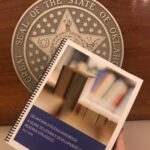Dyslexia laws and regulations
Dyslexia support for students is governed by a combination of federal and state laws, providing a roadmap for necessary services. While not perfect, these laws guide families and schools. Both educators and families must learn the laws and regulations, and assessments are necessary to identify needs and build goals that will guide services.
There is nothing in state or federal law that would prohibit the use of dyslexia on a child’s IEP or 504 plan. In October 2015, the US Department of Education’s Dear Colleague letter clarified that there is nothing in the IDEA that would prohibit the use of the terms dyslexia, dyscalculia, and dysgraphia in IDEA evaluation, eligibility determinations, or IEP documents.

Dyslexia Terms
There are many terms parents and educators need to learn to advocate. Federal and State Law have long names; many are spoken as easier acronyms or abbreviations. The Oklahoma Dyslexia Handbook appendix has a list of common acronyms and abbreviations.
The following are the most common rules and regulations for families seeking help.
- RSA Reading Sufficiency Act – Oklahoma
- IDEA Individuals with Disabilities Education Act 2004 – Federal
- IEP Individual Education Plan
- Child Find
- 504 Section 504 of the Rehabilitation Act of 1973 – Federal
Understanding these terms is important to facilitate communication between families and schools. These terms are simply the rules that schools must follow, and it is not a matter of “us vs. them”, but rather a collaborative process involving all members of families and schools.

Reading Sufficiency Act (RSA)
The term “dyslexia” may be brought up for the first time by the school during the Reading Sufficiency Act (RSA) screening in kindergarten-3rd grade. The RSA aims to ensure that all Oklahoma students are reading at grade level by the end of third grade. To achieve this goal, students in kindergarten-3rd grade are screened for reading difficulties. Those found to be at risk of reading difficulties will be screened for additional characteristics of dyslexia. It is important parents understand RSA rules, including the requirements for promotion or retention at the end of 3rd grade.
Coming soon “DDOK Family Guide for RSA”
Individuals with Disabilities
Education Act 2004 (IDEA)
The Individuals with Disabilities Education Act (IDEA) is a federal law that ensures students with disabilities receive a free appropriate public education (FAPE) in the least restrictive environment (LRE) possible. It provides funding to states and school districts to support the education of students with disabilities and requires that schools provide individualized education plans (IEPs) to eligible students. IDEA is important because it helps ensure that students with disabilities have access to the same educational opportunities as their peers and that their unique needs are addressed. Oklahoma recognizes dyslexia as a disability, specific learning disability (SLD), under the Individuals with Disabilities Education Act (IDEA). Students found eligible with a disability are given support and instruction under an Individual Education Plan (IEP). Schools are required to find students suspected of having a disability through the use of Child Find regulations in the Individuals with Disabilities Education Act. Oklahoma’s Dyslexia and Dysgraphia Handbook provides additional information for schools and families.
Section 504 of the Rehabilitation
Act of 1973
Section 504 is a federal law that prohibits discrimination against individuals with disabilities in programs and activities that receive federal financial assistance. It applies to public schools, colleges, and universities, as well as other entities that receive federal funding. Section 504 ensures that individuals with disabilities have equal access to education and other opportunities. It covers a wide range of disabilities, including dyslexia, and requires reasonable accommodations to ensure that individuals with disabilities can participate in programs and activities on an equal basis with others. Students with mild dyslexia or after remediation may benefit from the use of accommodation or accessible education materials to fully participate in the classroom. Oklahoma’s Dyslexia and Dysgraphia Handbook provides additional information for schools and families.
